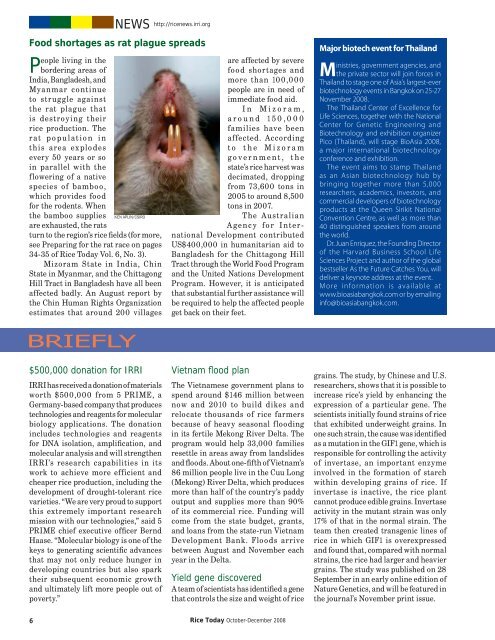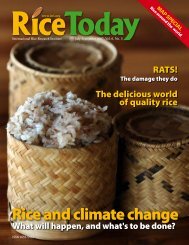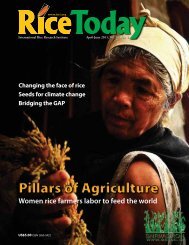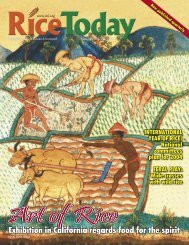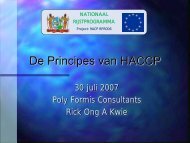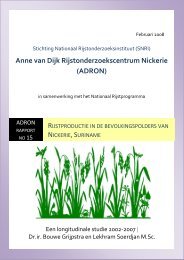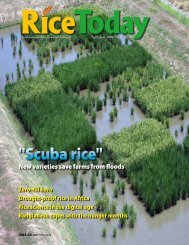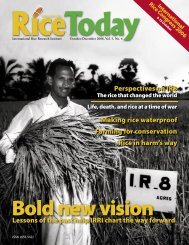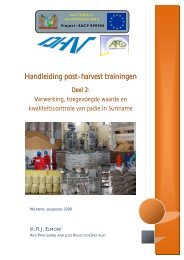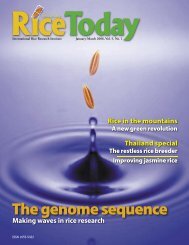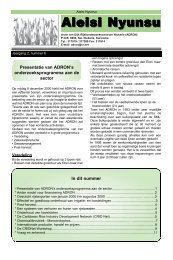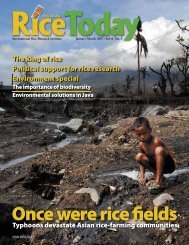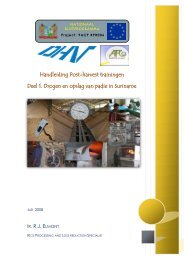Rice Today - adron.sr
Rice Today - adron.sr
Rice Today - adron.sr
Create successful ePaper yourself
Turn your PDF publications into a flip-book with our unique Google optimized e-Paper software.
NEWS http://ricenews.irri.orgFood shortages as rat plague spreadsPeople living in thebordering areas ofIndia, Bangladesh, andMyanmar continueto struggle againstthe rat plague thatis destroying theirrice production. Therat population inthis area explodesevery 50 years or soin parallel with theflowering of a nativespecies of bamboo,which provides foodfor the rodents. Whenthe bamboo supplies KEN APLIN/CSIROare exhausted, the ratsturn to the region’s rice fields (for more,see Preparing for the rat race on pages34-35 of <strong>Rice</strong> <strong>Today</strong> Vol. 6, No. 3).Mizoram State in India, ChinState in Myanmar, and the ChittagongHill Tract in Bangladesh have all beenaffected badly. An August report bythe Chin Human Rights Organizationestimates that around 200 villagesare affected by severefood shortages andmore than 100,000people are in need ofimmediate food aid.In Mizoram,around 150,000families have beenaffected. Accordingto the Mizoramgovernment, thestate’s rice harvest wasdecimated, droppingfrom 73,600 tons in2005 to around 8,500tons in 2007.The AustralianAgency for InternationalDevelopment contributedUS$400,000 in humanitarian aid toBangladesh for the Chittagong HillTract through the World Food Programand the United Nations DevelopmentProgram. However, it is anticipatedthat substantial further assistance willbe required to help the affected peopleget back on their feet.Major biotech event for ThailandMinistries, government agencies, andthe private sector will join forces inThailand to stage one of Asia’s largest-everbiotechnology events in Bangkok on 25-27November 2008.The Thailand Center of Excellence forLife Sciences, together with the NationalCenter for Genetic Engineering andBiotechnology and exhibition organizerPico (Thailand), will stage BioAsia 2008,a major international biotechnologyconference and exhibition.The event aims to stamp Thailandas an Asian biotechnology hub bybringing together more than 5,000researchers, academics, investors, andcommercial developers of biotechnologyproducts at the Queen Sirikit NationalConvention Centre, as well as more than40 distinguished speakers from aroundthe world.Dr. Juan Enriquez, the Founding Directorof the Harvard Business School LifeSciences Project and author of the globalbestseller As the Future Catches You, willdeliver a keynote address at the event.More information is available atwww.bioasiabangkok.com or by emailinginfo@bioasiabangkok.com.$500,000 donation for IRRIIRRI has received a donation of materialsworth $500,000 from 5 PRIME, aGermany-based company that producestechnologies and reagents for molecularbiology applications. The donationincludes technologies and reagentsfor DNA isolation, amplification, andmolecular analysis and will strengthenIRRI’s research capabilities in itswork to achieve more efficient andcheaper rice production, including thedevelopment of drought-tolerant ricevarieties. “We are very proud to supportthis extremely important researchmission with our technologies,” said 5PRIME chief executive officer BerndHaase. “Molecular biology is one of thekeys to generating scientific advancesthat may not only reduce hunger indeveloping countries but also sparktheir subsequent economic growthand ultimately lift more people out ofpoverty.”Vietnam flood planThe Vietnamese government plans tospend around $146 million betweennow and 2010 to build dikes andrelocate thousands of rice farmersbecause of heavy seasonal floodingin its fertile Mekong River Delta. Theprogram would help 33,000 familie<strong>sr</strong>esettle in areas away from landslidesand floods. About one-fifth of Vietnam’s86 million people live in the Cuu Long(Mekong) River Delta, which producesmore than half of the country’s paddyoutput and supplies more than 90%of its commercial rice. Funding willcome from the state budget, grants,and loans from the state-run VietnamDevelopment Bank. Floods arrivebetween August and November eachyear in the Delta.Yield gene discoveredA team of scientists has identified a genethat controls the size and weight of ricegrains. The study, by Chinese and U.S.researchers, shows that it is possible toincrease rice’s yield by enhancing theexpression of a particular gene. Thescientists initially found strains of ricethat exhibited underweight grains. Inone such strain, the cause was identifiedas a mutation in the GIF1 gene, which i<strong>sr</strong>esponsible for controlling the activityof invertase, an important enzymeinvolved in the formation of starchwithin developing grains of rice. Ifinvertase is inactive, the rice plantcannot produce edible grains. Invertaseactivity in the mutant strain was only17% of that in the normal strain. Theteam then created transgenic lines ofrice in which GIF1 is overexpressedand found that, compared with normalstrains, the rice had larger and heaviergrains. The study was published on 28September in an early online edition ofNature Genetics, and will be featured inthe journal’s November print issue.6 <strong>Rice</strong> <strong>Today</strong> October-December 2008RT7-4 (p1-23)_FA.indd 610/9/2008 8:24:02 AM


